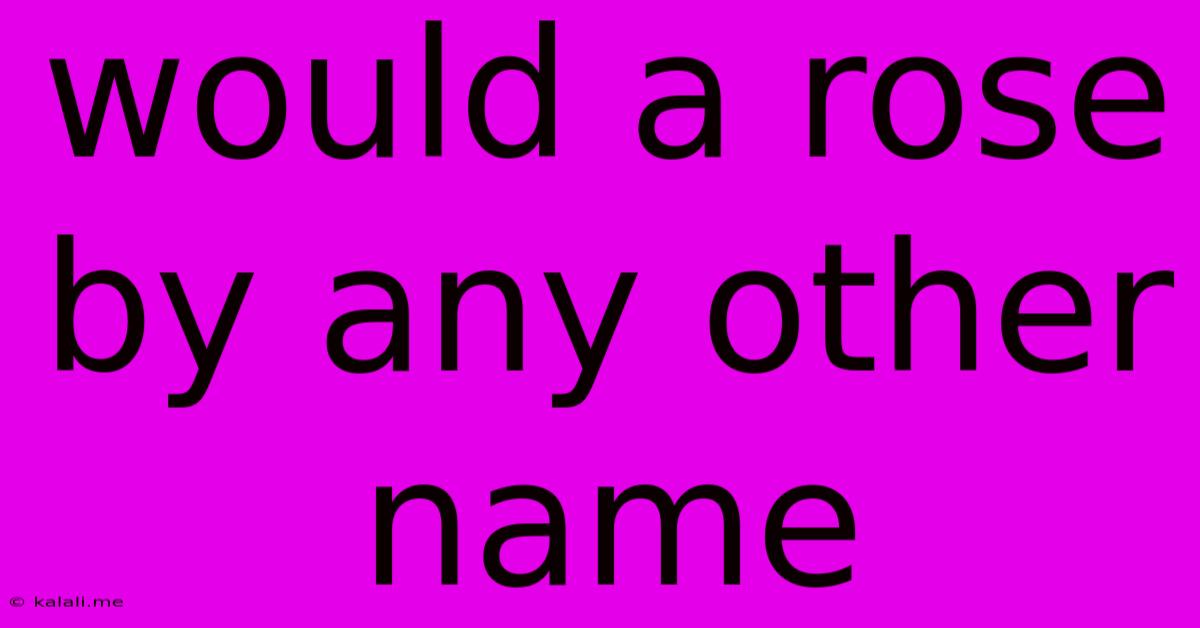Would A Rose By Any Other Name
Kalali
Jun 01, 2025 · 3 min read

Table of Contents
Would a Rose by Any Other Name Smell as Sweet? Exploring Shakespeare's Famous Question
Shakespeare's famous line, "What's in a name? That which we call a rose by any other word would smell as sweet," from Romeo and Juliet, sparks a timeless debate about the nature of identity, meaning, and perception. While seemingly simple, the quote delves into complex philosophical and linguistic questions that continue to resonate today. This article will explore the various interpretations of this seemingly straightforward question, examining its implications for naming conventions, personal identity, and the power of language itself.
The superficiality of names: At its most basic level, Shakespeare's statement suggests that the essence of something isn't defined by its name. A rose, regardless of whether it's called "rose," "rosa," or any other term, retains its inherent qualities – its fragrance, its beauty, its thorns. The name is merely a label, a human construct used for identification and communication, not an intrinsic part of the object itself. This perspective emphasizes the arbitrary nature of language, highlighting how we assign meaning to things rather than discovering inherent meanings within them.
Beyond the Rose: Extending the concept to personal identity: The implications extend far beyond the botanical world. Consider the impact of names on personal identity. Our names are often deeply intertwined with our sense of self, family history, and cultural background. Yet, Shakespeare's question prompts us to consider whether our core being would be altered if we were given a different name. Would our personality, talents, and relationships fundamentally change? The answer, for most, is likely no. Our identity, like the rose's scent, remains fundamentally unchanged regardless of the label attached.
The power of language and social constructs: However, to dismiss the significance of names entirely is to ignore the considerable power language holds in shaping our perceptions and social interactions. Names carry cultural weight, historical connotations, and social expectations. A name can influence how we're perceived by others, the opportunities we're afforded, and even our own self-perception. Therefore, while the rose's scent remains unaffected by its name, the perception of the rose – and indeed, the perception of individuals – is heavily influenced by the language used to describe it.
The interplay of essence and perception: This brings us to a crucial point: Shakespeare's question isn't a simple yes or no proposition. It's a complex exploration of the interplay between essence and perception. While the inherent qualities of something remain unaffected by its name, the meaning and value we ascribe to it are inextricably linked to the language we use to understand and communicate about it. This highlights the importance of careful consideration of language, especially regarding how it shapes our understanding of ourselves and the world around us.
Conclusion: A continuing conversation: Shakespeare's question, "What's in a name?", continues to provoke thought and discussion centuries later. It reminds us of the arbitrary nature of language, the power of perception, and the complex relationship between essence and label. It's a question that encourages us to consider the deeper meanings behind our words and the profound impact they have on shaping our reality. Ultimately, the answer may not be a simple "yes" or "no," but rather a nuanced exploration of the intricate dance between language, identity, and perception.
Latest Posts
Latest Posts
-
Height Of Washing Machine Drain Pipe
Jun 03, 2025
-
Male Usb C To Female Usb Pinout
Jun 03, 2025
-
How To Add Bullet Points In Google Sheets On Mac
Jun 03, 2025
-
How Will God Destroy The Earth
Jun 03, 2025
-
How To Clean Polyurethane Off Brush
Jun 03, 2025
Related Post
Thank you for visiting our website which covers about Would A Rose By Any Other Name . We hope the information provided has been useful to you. Feel free to contact us if you have any questions or need further assistance. See you next time and don't miss to bookmark.